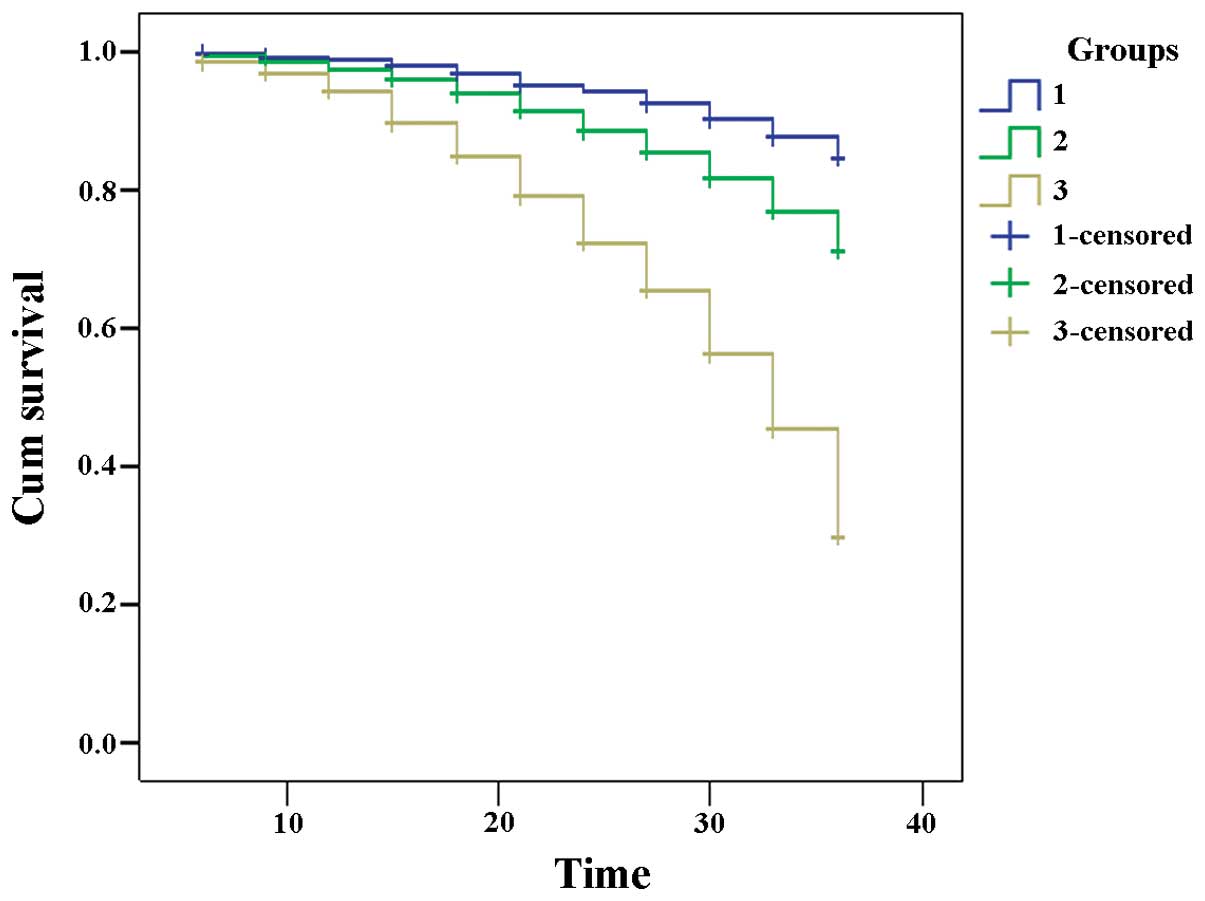|
1
|
Boden WE, O’Rourke RA, Teo KK, et al;
COURAGE Trial Research Group. Optimal medical therapy with or
without PCI for stable coronary disease. N Engl J Med.
356:1503–1516. 2007. View Article : Google Scholar : PubMed/NCBI
|
|
2
|
Ndrepepa G, Mehilli J, Schulz S, et al:
Prognostic significance of epicardial blood flow before and after
percutaneous coronary intervention in patients with acute coronary
syndromes. J Am Coll Cardiol. 52:512–517. 2008. View Article : Google Scholar : PubMed/NCBI
|
|
3
|
Sorajja P, Gersh BJ, Cox DA, et al: Impact
of multivessel disease on reperfusion success and clinical outcomes
in patients undergoing primary percutaneous coronary intervention
for acute myocardial infarction. Eur Heart J. 28:1709–1716. 2007.
View Article : Google Scholar
|
|
4
|
Yang JH, Gwon HC, Cho SJ, et al:
Comparison of coronary artery bypass grafting with drug-eluting
stent implantation for the treatment of multivessel coronary artery
disease. Ann Thorac Surg. 85:65–70. 2008. View Article : Google Scholar : PubMed/NCBI
|
|
5
|
Shishehbor MH, Lauer MS, Singh IM, et al:
In unstable angina or non-ST-segment acute coronary syndrome,
should patients with multivessel coronary artery disease undergo
multivessel or culprit-only stenting? J Am Coll Cardiol.
49:849–854. 2007. View Article : Google Scholar
|
|
6
|
Hannan EL, Racz M, Holmes DR, et al:
Impact of completeness of percutaneous coronary intervention
revascularization on long-term outcomes in the stent era.
Circulation. 113:2406–2412. 2006. View Article : Google Scholar : PubMed/NCBI
|
|
7
|
Ijsselmuiden AJ, Ezechiels J, Westendorp
IC, et al: Complete versus culprit vessel percutaneous coronary
intervention in multivessel disease: a randomized comparison. Am
Heart J. 148:467–474. 2004. View Article : Google Scholar : PubMed/NCBI
|
|
8
|
Hannan EL, Racz M, Holmes DR, et al:
Impact of completeness of percutaneous coronary intervention
revascularization on long-term outcomes in the stent era.
Circulation. 113:2406–2412. 2006. View Article : Google Scholar : PubMed/NCBI
|
|
9
|
Chu WW, Kuchulakanti PK, Rha SW, et al:
Impact of three or more versus a single sirolimus-eluting stent on
outcomes in patients who undergo percutaneous coronary
intervention. Am J Cardiol. 97:606–610. 2006. View Article : Google Scholar : PubMed/NCBI
|
|
10
|
Di Mario C, Mara S, Flavio A, et al:
Single vs. multivessel treatment during primary angioplasty:
results of the multicentre randomised HEpacoat for cuLPrit or
multivessel stenting for Acute Myocardial Infarction (HELP AMI)
Study. Int J Cardiovasc Intervent. 6:128–133. 2004.
|
|
11
|
Zahn R, Hamm CW, Schneider S, et al;
German Cypher Stent Registry. Incidence and predictors of target
vessel revascularization and clinical event rates of the
sirolimus-eluting coronary stent (results from the prospective
multicenter German Cypher Stent Registry). Am J Cardiol.
95:1302–1308. 2005. View Article : Google Scholar
|
|
12
|
Hannan EL, Racz M, Holmes DR, et al:
Impact of completeness of percutaneous coronary intervention
revascularization on long-term outcomes in the stent era.
Circulation. 113:2406–2412. 2006. View Article : Google Scholar
|
|
13
|
Dzavik V, Ghali WA, Norris C, et al;
Alberta Provincial Project for Outcome Assessment in Coronary Heart
Disease (APPROACH) Investigators. Long-term survival in 11,661
patients with multivessel coronary artery disease in the era of
stenting: a report from the Alberta Provincial Project for Outcome
Assessment in Coronary Heart Disease (APPROACH) Investigators. Am
Heart J. 142:119–126. 2001. View Article : Google Scholar
|
|
14
|
Favarato ME, Hueb W, Boden WE, et al:
Quality of life in patients with symptomatic multivessel coronary
artery disease: a comparative post hoc analyses of medical,
angioplasty or surgical strategies-MASS II trial. Int J Cardiol.
116:364–370. 2007. View Article : Google Scholar : PubMed/NCBI
|
|
15
|
Cosgrove DM, Loop FD, Lytle BW, et al:
Determinants of 10-year survival after primary myocardial
revascularization. Ann Surg. 202:480–490. 1985.PubMed/NCBI
|
|
16
|
Bell MR, Gersh BJ, Schaff HV, et al:
Effect of completeness of revascularization on long-term outcome of
patients with three-vessel disease undergoing coronary artery
bypass surgery. A report from the Coronary Artery Surgery Study
(CASS) Registry. Circulation. 86:446–457. 1992. View Article : Google Scholar : PubMed/NCBI
|
|
17
|
Buda AJ, Macdonald IL, Anderson MJ, et al:
Long-term results following coronary bypass operation. Importance
of preoperative factors and complete revascularization. J Thorac
Cardiovasc Surg. 82:383–390. 1981.PubMed/NCBI
|
|
18
|
Jones EL, Craver JM, Guyton RA, et al:
Importance of complete revascularization in performance of the
coronary bypass operation. Am J Cardiol. 51:7–12. 1983. View Article : Google Scholar : PubMed/NCBI
|
|
19
|
Hannan EL, Racz M, Holmes DR, et al:
Impact of completeness of percutaneous coronary intervention
revascularization on long-term outcomes in the stent era.
Circulation. 113:2406–2412. 2006. View Article : Google Scholar : PubMed/NCBI
|
|
20
|
Kip KE, Bourassa MG, Jacobs AK, et al:
Influence of pre-PTCA strategy and initial PTCA result in patients
with multivessel disease: the Bypass Angioplasty Revascularization
Investigation (BARI). Circulation. 100:910–917. 1999. View Article : Google Scholar : PubMed/NCBI
|
|
21
|
van den Brand MJ, Rensing BJ, Morel MA, et
al: The effect of completeness of revascularization on event-free
survival at one year in the ARTS trial. J Am Coll Cardiol.
39:559–564. 2002.PubMed/NCBI
|















